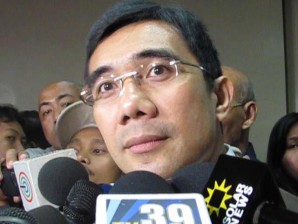Tupas admits ‘accommodation’ move by Palace rep on JBC
MANILA, Philippines – An ally of President Benigno Aquino III acknowledged on Saturday that Malacanang’s representative on the Judicial and Bar Council was trying to accommodate Justice Secretary Leila De Lima and two other nominees so they could be considered for the short list of candidates for chief justice to be submitted to the chief executive.
But Representative Niel Tupas Jr., the representative of the House of Representatives on the JBC and a key supporter of Aquino, said the accommodation by Michael Frederick Musngi was “understandable” given that he represented the executive branch.
Musngi, who works under the President’s “Office of Special Concerns,” was appointed by Malacañang to the JBC after De Lima inhibited herself from the deliberations as she was herself a candidate for the post vacated by the impeached Renato Corona.
“Well, probably it’s obvious because he is the representative of the executive,” Tupas replied in Filipino when asked in a phone interview whether some JBC members were trying to accommodate De Lima, who has two pending disbarment cases against her. “But we cannot say that of the other members who are very objective.”
De Lima, Solicitor General Francis Jardeleza and chairperson Teresita Herbosa of the Securities and Exchange Commission, are disqualified for nomination under Section 5 of the JBC rules, which bars “those with pending criminal and regular administrative cases” from being considered for the position.
Article continues after this advertisementDe Lima is facing disbarment cases for defying a Supreme Court temporary restraining order and for publicly criticizing then Chief Justice Corona. She also testified for the prosecution, which was headed by Tupas, in the Corona impeachment trial earlier this year.
Article continues after this advertisementIn the JBC meeting on Friday, Tupas said Musngi asked the body to “amend or suspend” the rule on disqualification.
“All three [nominees] who would be affected are from the executive [branch] so he has to defend [them], namely De Lima, Herbosa, and [Jardeleza],” said Tupas, who added he was amenable to suspending the rule on disqualification but not amending it at this time.
Tupas said an amendment to Section 5—a proposal he said he had made as early as August 2011—would require publication and as such, would not benefit the present crop of nominees. But he said some JBC members also believe that even a suspension of the rule would need the same requirement and therefore “cannot apply now.”
Tupas wanted to give the JBC the discretion to determine which pending cases would be allowed to affect a particular nomination.
“I am willing to listen to the arguments [during the next JBC meeting] on Monday if they want [the suspension] to take effect now or to take effect prospectively,” the congressman said.
But apparently more crucial than the proposed suspension or amendment of Section 5 was the “privileged motion” by another JBC member questioning the integrity of De Lima, Herbosa, and Jardeleza.
Tupas declined to name the JBC member, but described the motion as a “counter move” against Musngi’s push to lift the rule on disqualification. He said the motion was similar to the powerful rule in the Commission on Appointments that allows a lone member to block any appointment.
“Pamatay ‘yun,” he said, noting that under the rules, a motion questioning the integrity of a nominee could be defeated only by a unanimous vote.
Only if the JBC member reconsiders the motion could the council proceed with voting on whether to suspend or amend the rule on disqualification and therefore, allow De Lima, Herbosa, and Jardeleza to be considered for the list to be submitted to Aquino, according to Tupas. Under the law Aquino can choose the next chief justice only from the JBC list.
“If a member stands firm on that, we cannot do anything. Those with [pending] cases cannot be considered,” he said.
“It seems that he or she is firm on his or her decision—that’s my reading when we talked,” he added, referring to the JBC member behind the “privileged motion.”
